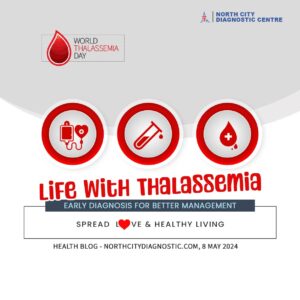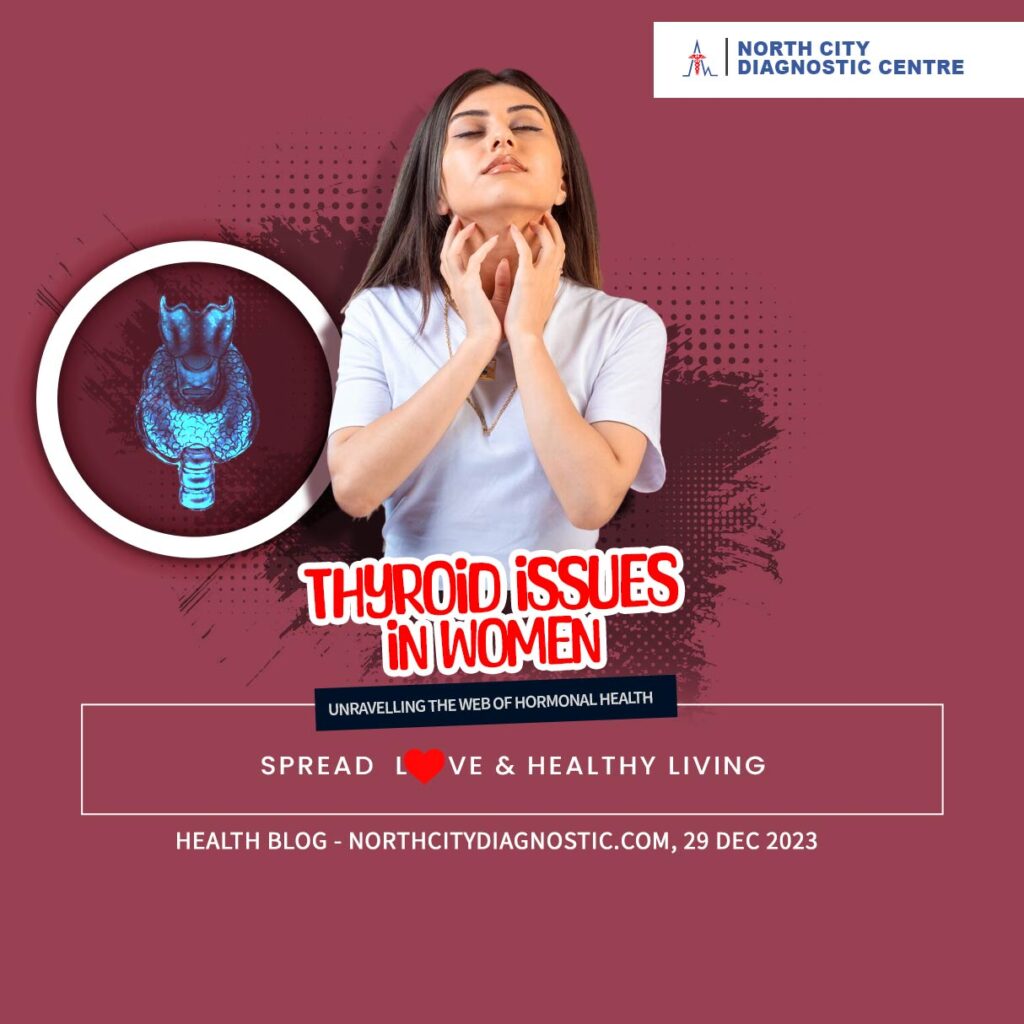
Menu
Thyroid issues are a significant factor that can disrupt the balance of hormones in women’s health. The complex tapestry of women’s health can be negatively impacted by thyroid problems, leading to physical and mental well-being issues.
Thyroid issues in women are often referred to as a silent intruder, affecting millions globally. The thyroid gland, a butterfly-shaped organ at the base of the neck, plays a pivotal role in regulating metabolism and hormone production. When this balance is disrupted, a cascade of effects can follow.

“In India, women, have higher prevalence of hypothyroidism, at 11.4%, when compared with men, in whom the prevalence was 6.2%. .”
– Thyroid Disorders in India: An Epidemiological Perspective, by Ambika Gopalakrishnan Unnikrishnan and Usha V. Menon
The thyroid gland, which is shaped like a butterfly, is situated at the front of your neck. It is a crucial component of the endocrine system, which regulates several vital functions of your body.
The thyroid gland produces two primary hormones:
Triiodothyronine is the active form of thyroid hormone. It is responsible for influencing the metabolism of cells throughout the body. T3 regulates various physiological processes, including heart rate, body temperature, and energy production. It is crucial for the proper functioning of organs and tissues.
Thyroxine is the primary hormone produced by the thyroid gland. It plays a central role in regulating the body’s metabolism, influencing how quickly the body uses energy, and maintaining overall energy balance. T4 is considered an inactive form, and its conversion to the active form, triiodothyronine (T3), occurs in various tissues.
Another hormone produced by the thyroid gland is Calcitonin
Calcitonin is a hormone from your thyroid gland. It works to control the amount of calcium in your blood by lowering it. It does the opposite of another hormone called parathyroid hormone, which raises your blood calcium levels. It blocks osteoclasts, cells that break down bone, reducing the release of calcium into the bloodstream. It also lowers blood calcium levels by limiting how much calcium your kidneys reabsorb and release back into your bloodstream.
These thyroid hormones are vital for the body’s overall well-being and impact several key functions:
Metabolism Regulation: Thyroid hormones control the rate at which the body converts food into energy (metabolism). This, in turn, affects weight management and energy levels.
Temperature Regulation: Thyroid hormones help regulate body temperature by influencing heat production and dissipation.
Heart Rate and Cardiovascular Function: Thyroid hormones play a role in controlling heart rate and maintaining the health of the cardiovascular system.
Brain Development (especially in infants and children): Adequate thyroid hormones are essential for proper brain development, particularly during infancy and childhood.
Bone Health: Thyroid hormones contribute to maintaining bone health by influencing bone turnover and mineral density.
Muscle Function: Proper thyroid function is necessary for normal muscle function and strength.
Women Reproductive System: The thyroid gland plays a crucial role in a woman’s reproductive system. Hormonal imbalances due to thyroid activity can have adverse effects on the body.
Life Stage | Effect of Thyroid Issues on Women’s Reproductive System |
Puberty & Menstruation | · Thyroid disorders can disrupt ovulation, potentially causing infertility. · Women with an underactive thyroid face an elevated risk of ovarian cyst development. · Severe hypothyroidism may induce breast milk production while inhibiting ovulation. |
Reproduction | · Thyroid disorders can disrupt ovulation, potentially causing infertility. · Women with an underactive thyroid face an elevated risk of ovarian cyst development. · Severe hypothyroidism may induce breast milk production while inhibiting ovulation. |
Pregnancy & Postpartum | · Pregnant women with thyroid disorders risk harm to the fetus and postpartum thyroiditis. · Thyroid hormone deficiency can contribute to miscarriages, preterm delivery, stillbirth, and postpartum hemorrhage. · Overactive thyroid during pregnancy may intensify morning sickness, necessitating individualized treatment decisions. |
Menopause | · Thyroid disorders might accelerate the onset of menopause, resulting in symptoms like menstrual irregularities, hot flashes, insomnia, and mood swings. · Treating hyperthyroidism can mitigate or prevent symptoms, preventing confusion with early menopause. |
Also Read →
The pituitary gland, a small pea-sized gland located at the base of the brain, is responsible for producing thyroid stimulating hormone (TSH). TSH plays a crucial role in regulating the thyroid gland’s function, which is responsible for producing and secreting hormones that help control the body’s metabolism. When the pituitary gland detects that the body needs more thyroid hormone, it produces more TSH, which signals the thyroid gland to increase hormone production. Conversely, when the body has sufficient levels of thyroid hormone, the pituitary gland reduces TSH production, thereby decreasing the thyroid’s hormone output. This feedback loop helps maintain the body’s homeostasis and ensures that there is not an excessive or deficient production of thyroid hormone.
Understanding the intricate web of factors that contribute to thyroid issues in women is crucial for effective management and prevention. Here’s a detailed breakdown:
This holistic understanding empowers women to take proactive steps toward maintaining optimal thyroid health.
Did you know?
As per Ministry of Health and Family Welfare Kerala, J&K, Delhi& NCR, Telangana and West Bengal are the top 5 stated with Goitre or Thyroid disorders in women.
Goiter is a condition in which the thyroid gland becomes enlarged, and can either affect the entire gland or develop one or more small lumps referred to as thyroid nodules.
It has several possible causes and may or may not be associated with abnormal thyroid hormone levels
Treatment options depend on the cause and severity of the condition, and can include medication, surgery, or radioactive iodine therapy. It’s important to consult a medical professional if you suspect you may have goiter, as they can diagnose the condition and recommend the most appropriate treatment plan.
Elevated TSH may suggest an underactive thyroid (hypothyroidism), while low levels may indicate an overactive thyroid (hyperthyroidism).
This blood test diagnoses hyperthyroidism and is usually ordered with other thyroid function tests.
This test checks your thyroid function and helps diagnose and monitor thyroid disorders such as Hyperthyroidism, Hypothyroidism, and pituitary gland disorders. A free T4 test directly measures the amount of free T4 in your blood, which is more accurate than a total T4 test.
This test measures the level of thyroid antibodies in your blood. These antibodies can cause autoimmune diseases such as Hashimoto’s Disease and Graves‘ Disease. Thyroid antibody tests, including Anti-Thyroid Peroxidase Antibodies (TPOAb) and Anti-Thyroglobulin Antibodies (TgAb), help diagnose these autoimmune disorders. It is also helps in identification of Goiter.
Also Read →
Thyroid issues, though usually manageable with proper medical care, may in some stray occasion have a potential link to cancer, especially in women. Thyroid cancer is more common in women, and autoimmune thyroid disorders, like Hashimoto’s thyroiditis, elevate the risk of cancer. Childhood radiation exposure and a family history increase the likelihood of cancer.
Early detection is crucial for favorable outcomes in thyroid cancer, with treatment options like surgery, radioactive iodine therapy, and hormone replacement available. Regular check-ups facilitate early detection and prompt management.
According to Johns Hopkins Medicine, “Most thyroid cancer develops more slowly than other kinds of cancer, it is highly treatable. In fact, the chance of surviving 20 years after diagnosis of the most common type, papillary thyroid carcinoma, is 98%.”
In cases of suspicious nodules or growths detected through ultrasound, FNA biopsy is performed. A small tissue sample is extracted for laboratory analysis to determine if the growth is benign or malignant.
Involves the administration of a small amount of radioactive material followed by a scan. Assesses the size, shape, and function of the thyroid gland.
This test helps to measure the level of calcitonin, a hormone produced by thyroid cells. It helps to detect and monitor medullary thyroid cancer.
Creating awareness about thyroid issues is an empowering step toward better health outcomes. Initiatives that educate women about the importance of regular check-ups, symptom recognition, and de-stigmatizing thyroid disorders contribute to a healthier, informed society.
You can get your Thyroid Test done at North City Diagnostic Centre. Home collection available. To know more please call ☎ +91 81001 07100 you can also book a test directly by clicking the link → Book Thyroid Test
At North City Diagnostic Center we offer personalized testing schedule that aligns with your medical history and risk factors. Consistent monitoring can be invaluable for early detection and effective management of arthritis. It’s not just about how often you test but making sure that the tests are aligned with your overall health profile for maximum benefit.
#ThyroidHealth #WomenWellness #HormonalBalance #ThyroidAwareness #WomenHealth #DecodingThyroid #ThyroidEducation #HormoneHealth #WellnessJourney #ThyroidTalk #WomensHealthMatters #ThyroidAware #HormonalWellbeing #EmpowerWomen #HealthEducation #DecodingHealth #ThyroidTalks #WellnessWisdom #EmpowerYourHealth #ThyroidTips #HealthandWellness #HealthJourney #HealthFirst #NorthCity #HealthBlog #NDC #NorthCityDiagnostic #DiagnosticServices #HealthKnowledge
35-A ,Canal West Road
Near Gouri Bari Bus Stop
Kolkata – 700004.
Local: +91 33 6605 0888